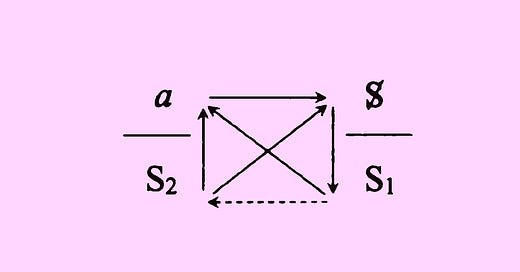Introducing Seminar XIX: Masculine & Feminine Subjectivities
Excerpts from our Recent Series on Seminar XVIII
Lacan hits the ground running in Seminar XIX — and right back to Aristotle. Why? Because he wants to show that the formulas of sexuation he began to develop in his previous seminar — On a Discourse That Might Not Be a Semblance (Seminar XVIII) — are founded on a certain mathematico-logic extending from antiquity, in which letters and numbers, when italicized, over-lined, flipped backwards, and turned upside down, can be used to account for the impossible, which is to say, the real.
And one impossibility in particular: the sexual relation. On this point, Lacan is adamant, but also elusive, at the start of Seminar XIX: Even though “there is no such thing as sexual relation,” it nevertheless “regulates everything that is involved in our experience” to such an extent that this non-existence constitutes the basic question of human togetherness (pp. 13-14).
Which is why I’m writing to you now, since the question of a sexual relation which is no such thing also appears to be one of the most difficult questions for Lacanians to answer!
In hopes of easing our way into this topic — a topic which our upcoming series on Seminar XIX will almost certainly bring into sharp focus — here are some excerpts from our recent recordings on Seminar XVIII. In these clips, I attempt to clarify Lacan’s early formulations of sexual difference — the same formulations which, at the start of Seminar XIX, he expects his audience to already know backwards and forwards! 🤣



